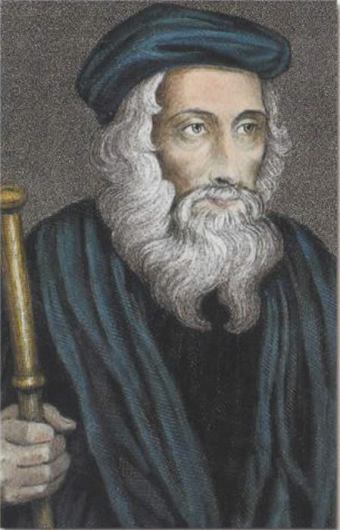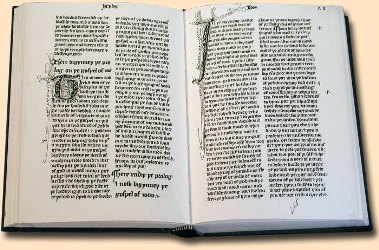CHURCH HISTORY
Church Foundations
John Wycliffe
By Brandon Markette

One of his earliest controversies revolved around the concept of authority. In 1370 Wycliffe wrote Civil Dominion. In it, Wycliffe argues the ungodly have no right to rule. All rulership comes from God, but the unjust ruler breaks God's purposes and, thus, loses his right to rule. During this time the church owned about 1/3 of the land in England and were exempt from taxes. Needing to raise money for the ongoing war with France, the English government found in Wycliffe's arguments a way to extract taxes from clergy or at least negotiate with papacy over the issue of taxation. By 1377 the Pope denounced 18 of Wycliffe's statements and the English bishops attempted to try him. John of Gaunt, a friend of Wycliffe's, was able to protect him because of the help his views provided the English government.
That would not be Wycliffe's last brush with the papacy. In 1378 he wrote The Truth of Holy Scripture. Because Scripture is God's complete revelation and the final authority over tradition, canon law, popes, and councils, Wycliffe held that Scripture should be available to all — laity as well as clergy. Out of this belief would come the Wycliffe Bible, translated from Latin into the local vernacular. Once again his views, which today seem rather mundane, where seen as controversial. Another trial was attempted, and this time the Queen mother protected Wycliffe from the bishops.
 The following year found Wycliffe becoming even more controversial. In 1379 he wrote The Power of the Papacy to argue that the position of Pope was invented by man and not instituted by God. Further, if the man holding that position did not share the moral character of St. Peter, then he did not have any authority.
The following year found Wycliffe becoming even more controversial. In 1379 he wrote The Power of the Papacy to argue that the position of Pope was invented by man and not instituted by God. Further, if the man holding that position did not share the moral character of St. Peter, then he did not have any authority.While his connections in the English government helped to protect Wycliffe, their favor was not to last. In 1381 Wycliffe once again found himself in hot water, this time with the English. A peasant revolt occurred that year and the rebels killed the archbishop of Canterbury. It was reported that one of the leaders was a follower of John Wycliffe. Despite Wycliffe's renunciation of the revolt, he became associated with it. Thus, in 1382 Wycliffe stood trail again. Twenty-four of his statements were condemned by the new Archbishop of Canterbury, William Courtenay. Now Wycliffe withdrew from Oxford to his parish. Later that year he suffered a stroke and, on New Year's Eve in 1384, John Wycliffe died.
However, Wycliffe's influence continued. He is often called the "morning star of the reformation" because his followers, the Lollards, continued to spread his teaching. Even after they were persecuted, still his ideas were taught. Those ideas spread all the way to Bohemia where they influenced the Czech reformer, John Hus. Eventually some of Wycliffe's ideas would be heard again in the writings of Reformers like Luther and Calvin.
Tags: History-Apologetics | Theological-Beliefs
comments powered by Disqus
Published 5-28-2014

